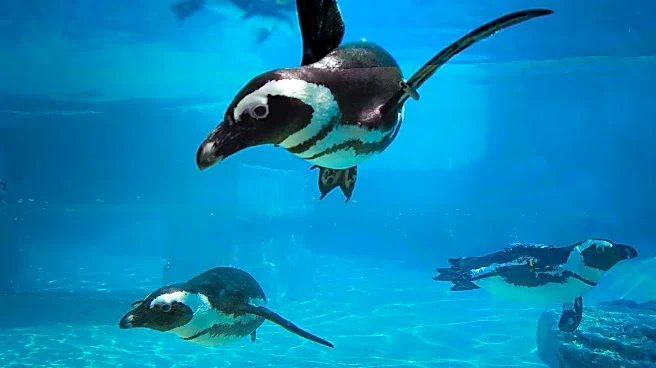What's Happening?
Concerns have been raised over the living conditions of gentoo penguins at the Sea Life London Aquarium. Critics argue that the penguins are housed in an environment lacking daylight, fresh air, and sufficiently deep water. British lawmakers, led by David
Taylor of the Labour Party, have signed an open letter to Environment Secretary Emma Reynolds, urging the relocation of the penguins to a facility that better meets their behavioral, ecological, and physiological needs. The aquarium claims its enclosure meets government standards, but campaigners and visitors have expressed doubts about the adequacy of these conditions. The issue has gained traction with protests and a petition calling for the penguins' relocation.
Why It's Important?
The situation highlights ongoing debates about animal welfare standards in captivity, particularly in popular tourist attractions. The campaign to relocate the penguins underscores the ethical considerations of keeping animals in environments that may not fully cater to their natural behaviors. This could lead to increased scrutiny of animal welfare practices in zoos and aquariums, potentially influencing public policy and industry standards. The involvement of lawmakers suggests a growing political interest in animal rights, which could result in legislative changes or increased regulatory oversight.
What's Next?
The campaign to relocate the penguins is likely to continue gaining momentum, with further protests and advocacy efforts expected. The aquarium may face pressure to reassess its practices and improve conditions for the penguins. If the government intervenes, it could lead to a review of animal welfare standards in captivity, potentially setting a precedent for other facilities. The outcome may influence public perception and visitation rates, impacting the aquarium's operations and reputation.
Beyond the Headlines
The ethical debate surrounding the penguins' living conditions raises broader questions about the treatment of animals in captivity. It challenges the balance between entertainment and animal welfare, prompting discussions on the moral responsibilities of institutions that house animals for public viewing. This could lead to a cultural shift towards more humane practices and increased advocacy for animal rights.















